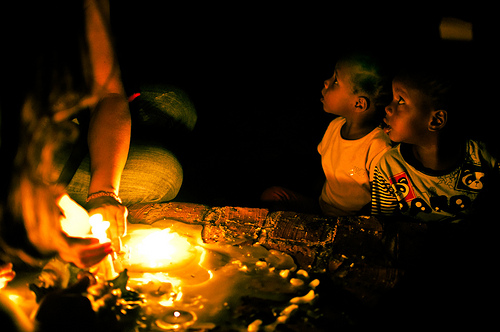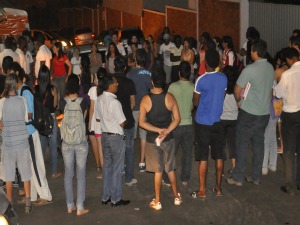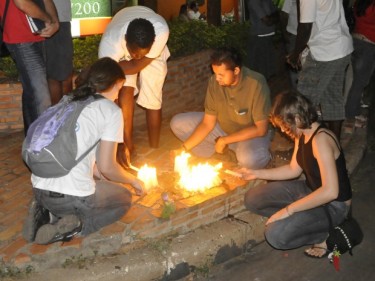All links lead to Portuguese language pages.
Around 100 people gathered in Cuiabá, the capital of the Brazilian state of Mato Grosso, on September 23, 2011, to protest against violence and call for justice in the wake of the murder of Toni Bernardo da Silva, a 27 year old Economic Science student from Guinea-Bissau on Thursday, September 22.
The protest, which took place in front of the pizzeria where Toni was beaten to death, was organised by a group of African students who are part of an exchange program between the Brazilian government and lusophone countries in Africa. Toni was a a student at the Federal University of Mato Grosso (UFMT).
Vicious attack
According to the civil police, the former student arrived at the restaurant around 11pm and started asking clients for money. While passing one of the tables, Toni bumped into a woman.
The woman's boyfriend, a 27 year old business man, and two military policeman who were in plainclothes at the site, forcibly removed the university student from the establishment and began to attack him with punches and kicks. The medical report indicates that death was caused by disruption of the trachea, caused by a sharp blow by a person who practices martial arts.
The suspects were charged in the act and will respond in court for the crime of murder. In a statement, they said that they had only immobilised the youngster.
Community outrage
The crime has caused outrage among the academic community, which is demanding justice and greater security for the students. In 2010, Global Voices reported [en] on another case of aggression against a student from Guinea Bissau.
UFMT released a message regretting the incident and contacted the Ministries of Education and Foreign Affairs, who coordinate the exchange program, as well as the Federal Police.
Toni was a fellow at the university and should have been graduating later this year in the course that he began in 2006. However, according to a spokesperson of the institution, he had abandoned the course:
Em 2010, a Pró-Reitoria de Ensino de Graduação apoiou o então aluno e tentou auxiliá-lo para resolução de seus problemas acadêmicos e pessoais, que geraram o abandono dos estudos e a reprovação. Foi prestada assistência e oferecido acompanhamento psicológico ao estudante, por meio da Coordenação de Assistência e Benefícios (Cabes), sem a sua adesão satisfatória. Consequentemente, o desligamento ocorreu em fevereiro de 2011, conforme as exigências estabelecidas pelo Convênio PEC-G/MEC/MRE, entre as quais o abandono dos estudos e a reprovação.
According to student Catende Malan Domingos, 23, who is also part of the international exchange program, Toni had abandoned his studies due to discouragement or to some diesase. On the other hand the police state that he was a drug addict and had a record of theft. Since February 2011 his family had been sending him money to survive on while he was looking for a job. He has left a Brazilian girlfriend who is pregnant.
“The biggest threat is the silence”
The journalism student Adoniram Magalhães, on his blog Jornalismo Liberto, has written an analysis that sums up the way the case was covered by the local media:
(…) alguns veículos publicaram e ainda publicam o fato de uma forma estranha, parecem até que estão procurando justificativa para o fato, desvirtuando o foco da morte de um ser humano que poderia ser brasileiro, africano ou iraquiano.
The photographer Lucas Ninno, on his blog, has published an audio interview with a Cape Verdean student in Cuiabá, a friend of Toni's, telling a “version that the media doesn't show” about the case:
An email in circulation that talks about the climate of fear that has been instilled amongst African students at UFMT, for whom “the biggest threat is the silence” asks:
que a Universidade (UFMT) [tome] alguma atitude no sentido de os representar, bem como ao jovem assassinado, pressionando a justiça brasileira a não permitir que o caso [seja] (mais uma vez) abafado e que os culpados recebesse a punição merecida. Fizeram uma passeata a pedir Paz. A polícia não deve estar confortável com esta atitude. Há indícios de que a polícia esteja a tentar silenciar as testemunhas e a fazer contra-informação. A polícia ronda o bairro escuro e pobre onde a maioria destes estudantes moram. Por alguma razão estes jovens não se estão a sentir mais seguros com isso.

Friends and university colleagues of Toni have put candles in front of the crime site. Photo by Lucas Ninno (used with permission).
And finalises:
Se ninguém mais no mundo souber do que se está a passar ali o que será que lhes pode acontecer mais? O medo instalou-se. A História conta-nos que o medo é inimigo da razão, da sensatez. Quantos não são os casos de escaladas de violência nas ruas que começaram exactamente assim?
The Brazilian Minister of Foreign Affairs Antonio de Aguiar Patriota personally presented his apologies to Ambassador Queta, Chancellor and future Minister of Justice of Guinea-Bissau, on behalf of the Brazilian government for the violence committed against the youngster.
The heads of state are in New York because of the 66th annual meeting of the United Nations.










1 comment